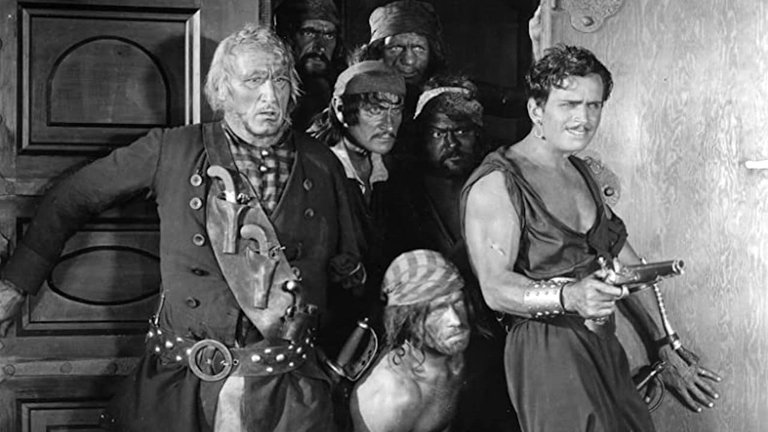Film Review: The Black Pirate (1926)

Douglas Fairbanks is in popular imagination often seen as a textbook example of a grand silent era star whose career came to an end because he couldn't have adapted to sound technology. In reality, Fairbanks' relative lack of success in the sound era had more to do with his declining health and age that had precluded him from starring in adventure films that had been his forte. When at the top of his game as a popular actor and producer, Fairbanks was actually quite enthusiastic about the development of new technology. This included one of his most successful hits, The Black Pirate, a 1926 silent adventure film directed by Albert Parker, known as one of the most ambitious early experiments with colour cinematography.
The plot, set somewhere in "the South Seas" during the Golden Age of Piracy, begins after the pirates have captured a Spanish galleon. After all the loot has been taken away, the pirate captain (played by Anders Randolf) orders all members of the galleon's crew to be tied up and the ship's gunpowder to be set alight. The ensuing explosion is survived by a noble passenger (played by Charles Belcher) and his son (played by Fairbanks) who manage to swim to a nearby island. The father, however, dies of wounds and exhaustion and his son swears revenge on the pirates. The opportunity for that comes sooner than he had hoped because the pirate captain comes to the island to bury the treasure. Before he can do that, the young noble challenges him to a duel and kills him. Calling himself a "Black Pirate", he asks to, according to custom, become the new captain, but the pirates will accept him only if he achieves an extraordinary feat. He does so by single-handedly capturing a merchantman. Among the prisoners is Princess Isobel (played by Billie Dove) with whom the "Black Pirate" instantly falls in love. He tells his men that she and the ship should be ransomed, which doesn't sit well with the Pirate Lieutenant (played by Sam De Grasse) who wants the Princess for himself. The "Black Pirate" now must find ways to protect Princess Isobel and receives help from the kind-hearted pirate named McTavish (played by Donald Crisp).
The Black Pirate was the third major film to use two-strip Technicolor, an early version of the process that allowed recording and reproduction of colour on film. Those images aren't as bright as three-strip Technicolor, an updated version that would become standard in Hollywood a decade later, but they were quite impressive for the average audience in the 1920s. The viewers were, however, even more attracted by Fairbanks delivering another blend of swashbuckling action, breathtaking stunts, some humour and period spectacle. The script for The Black Pirate, written by Jack Cunningham, was, unlike most of Fairbanks's previous hits, original and used or introduced many of the plot elements that would become standard for the pirate genre – secret treasure buried at remote islands, naval battles involving cannons, swordplay and walking the plank. The Black Pirate, although not as grandiose as Robin Hood or as imaginative as The Thief of Bagdad, provides quite a lot of spectacle and plenty of action. Shot on locations around Santa Catalina Island and on Fairbanks' own estate, The Black Pirate featured old sailing ships being reconstructed with a combination of full-size replicas and miniature models and with the use of simple but effective special effects. Fairbanks is again in his element, plays a very physical role and takes part in many impressive stunts. One of them, which features sail-sliding with a knife, represents one of the most iconic shots in the history of silent Hollywood and was later repeated in many pirate films, including those starring Fairbanks' successor Errol Flynn. The final showdown, which features the protagonist attacking a pirate ship with a galley, is, on the other hand, one of almost surreal moments because the galley and its crew look like they were left from the set of Ben-Hur. There is also some humour provided by Donald Crisp, an English actor who was originally slated to direct and who would later have a successful career with character roles in the sound era. Albert Parker as director does a rather unremarkable job, but he keeps a quick tempo and The Black Pirate with barely an hour and a half of running time is relatively short and easily digestible, even to an audience not accustomed to silent cinema. The Black Pirate was a big box office hit, but its two-strip Technicolor processing later created all kinds of problems during projections, forcing Fairbanks to later distribute the film in regular black-and-white versions. The film, apart from being an entertaining piece of silent Hollywood, was nevertheless a bold experiment and Fairbanks, if not for sound being introduced a year later with The Jazz Singer, would have been recognised as one of the great cinema pioneers.
RATING: 7/10 (+++)
Blog in Croatian https://draxblog.com
Blog in English https://draxreview.wordpress.com/
InLeo blog https://inleo.io/@drax.leo
InLeo: https://inleo.io/signup?referral=drax.leo
Unstoppable Domains: https://unstoppabledomains.com/?ref=3fc23fRc42c1b417
Hiveonboard: https://hiveonboard.com?ref=drax y
Bitcoin Lightning HIVE donations: https://v4v.app/v1/lnurlp/qrcode/drax
Rising Star game: https://www.risingstargame.com?referrer=drax
1Inch: https://1inch.exchange/#/r/0x83823d8CCB74F828148258BB4457642124b1328e
BTC donations: 1EWxiMiP6iiG9rger3NuUSd6HByaxQWafG
ETH donations: 0xB305F144323b99e6f8b1d66f5D7DE78B498C32A7
Posted using CineTV
Congratulations @drax! You have completed the following achievement on the Hive blockchain And have been rewarded with New badge(s)
You can view your badges on your board and compare yourself to others in the Ranking
If you no longer want to receive notifications, reply to this comment with the word
STOPCheck out our last posts: